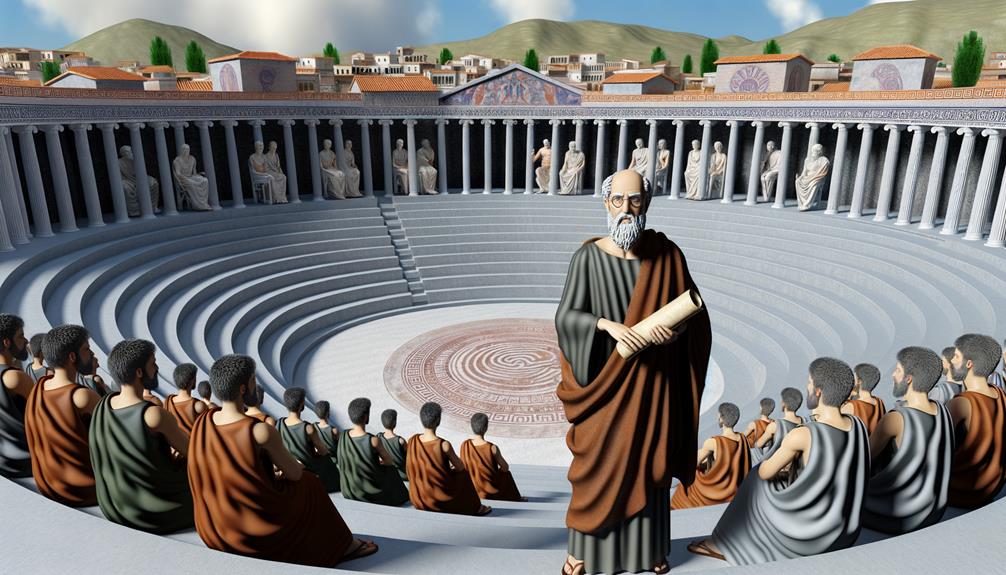Exousia Meaning In The Bible: Authority and Power
In the Bible, the Greek term ‘exousia‘ translates to ‘authority‘ or ‘power,’ and is utilized to denote both divine and delegated authority. This concept embodies legitimate power, governance, and control, reflecting God’s supreme sovereignty and the entrusted authority to individuals, especially within the New Covenant.
It contextualizes Jesus’ divine rights, including performing miracles, teaching, and the capacity to forgive sins, while also extending to the apostles’ and believers’ empowerment for spiritual tasks and warfare. Understanding ‘exousia’ reveals the theological and hierarchical dynamics essential in Biblical narratives and ecclesiastical roles.
To grasp the profound implications, deeper insights into its varied applications are necessary.

Exousia Meaning in the Bible: Authority and Divine Power Explained
| Aspect | Description |
|---|---|
| Word Definition | Greek word (ἐξουσία) meaning authority, power, or the right to act |
| Common Usage | Refers to God-given authority, especially in Jesus’ ministry |
| Key Scripture | Matthew 28:18 – “All authority (exousia) in heaven and on earth…” |
| Spiritual Meaning | Signifies divine permission and power to act on God’s behalf |
| Application in Believers | Believers are given exousia to overcome spiritual darkness (Luke 10:19) |
| Theological Insight | Highlights Jesus’ divine authority and the kingdom power given to His followers |
Definition of Exousia

Frequently encountered in theological studies, the term ‘exousia‘ is a Greek word that signifies authority, power, or the right to act, often used in the context of divine or delegated authority in the Bible.
This term encapsulates the concept of legitimate power and the capacity to exercise control or governance.
In biblical texts, ‘exousia’ is frequently employed to denote God’s supreme authority and the bestowed authority on individuals, such as prophets, apostles, and Christ himself. It is used to affirm the sanctioned power that comes from divine endorsement.
Understanding ‘exousia’ necessitates recognizing its implications for hierarchical order within the spiritual domain, underscoring the foundational belief that all authority ultimately originates from the divine.
Exousia in Greek Culture

In Greek culture, ‘exousia’ was a multifaceted concept that extended beyond mere authority or power, encompassing the legitimate right to make decisions and wield influence within various societal and political spheres.
This term was integral to the understanding of hierarchical relationships and governance, highlighting the nuances of leadership and control.
Key aspects of ‘exousia’ in Greek culture include:
- Political Authority: The power vested in rulers and officials to govern.
- Legal Rights: The lawful entitlements and privileges of individuals.
- Social Influence: The capacity to shape societal norms and values.
- Philosophical Dimensions: Debates on the nature and limits of power.
These dimensions illustrate how ‘exousia’ permeated various facets of Greek life and thought.
Exousia in the New Testament

The concept of ‘exousia’ in the New scripture is pivotal, encompassing themes of divine authority, spiritual empowerment, and the legitimization of Christ’s teachings and actions.
In the New writings, ‘exousia’ is frequently employed to denote the authority granted by God, particularly as it relates to the apostles and early Christian leaders. This term underscores the divine endorsement of their mission and the inherent power to perform miracles, cast out demons, and spread the Gospel.
Additionally, ‘exousia’ signifies the transformative authority that believers receive through the Holy Spirit, enabling them to live according to divine precepts.
Jesus and Exousia

In examining Jesus and exousia, one observes His unique authority manifested in various dimensions—His command over nature, the power to forgive sins, and His distinctive mode of teaching.
Each of these facets not only underscores His divine prerogatives but also challenges traditional understandings of authority within the socio-religious context of His time.
These elements collectively articulate a profound theological assertion of Jesus’ inherent exousia.
Authority Over Nature
Demonstrating unequivocal authority over natural elements, Jesus’ command over the storm as depicted in the Gospels exemplifies the term ‘exousia’ in its fullest biblical sense. This episode, narrated in Mark 4:35-41, showcases Jesus’ divine power to subdue nature, reinforcing His unique dominion.
The disciples’ awe and subsequent questioning, ‘Who then is this, that even the wind and the sea obey him?’ (Mark 4:41 ESV) underscore the extraordinary nature of this authority.
Key aspects of this authority include:
- Commanding silence and stillness amid a tempest
- Instantaneous cessation of wind and waves
- Evoking fear and reverence among witnesses
- Illustrating divine intervention in natural phenomena
Such demonstrations of exousia affirm Jesus’ divine status and authority.
Power to Forgive
Jesus’ authority (‘exousia’) to forgive sins, as illustrated in various Gospel accounts, presents a profound theological assertion of His divine prerogative and messianic identity.
The narrative in Mark 2:1-12, where Jesus heals a paralytic, underscores this authority. When He declares the man’s sins forgiven, the scribes react with indignation, questioning who can forgive sins but God alone.
Jesus’ response, coupling the forgiveness of sins with a miraculous healing, serves as a tangible demonstration of His divine authority. This act not only validates His exousia but also confronts prevailing religious norms, emphasizing His unique role in salvation history.
Such passages affirm the intrinsic link between Jesus’ exousia and His mission to reconcile humanity with God.
Teaching With Authority
How does the concept of ‘exousia’ manifest in the authoritative manner with which Jesus teaches throughout the Gospels?
Jesus’ teaching exudes ‘exousia,’ or divine authority, which distinguishes Him from other religious leaders. This is evident in several key aspects:
- Content of Teachings: Revolutionary interpretations of the Law.
- Methodology: Direct statements such as ‘But I say to you…’
- Reactions from the Audience: Amazement and astonishment at His authority.
- Evidence of Authority: Miracles and healings accompanying His words.
These elements underscore the unique and divine nature of Jesus’ exousia, establishing Him as a central authoritative figure in Christian theology, whose words carry the weight of divine mandate.
Apostles and Exousia

Frequently, the concept of ‘exousia‘ is essential in understanding the authority endowed upon the apostles in the New Covenant. This Greek term, often translated as ‘authority’ or ‘power,’ provides a theological framework for the apostles’ actions and teachings.
The Gospels and Acts consistently depict the apostles exercising ‘exousia’ to perform miracles, teach with divine authority, and establish the early Church. For instance, in Luke 9:1-2, Jesus grants the Twelve authority over demons and diseases, illustrating their delegated power.
Moreover, ‘exousia’ is not merely about capability but conveys a divinely sanctioned right to act on behalf of Christ, thereby solidifying their foundational role in the nascent Christian community. Understanding ‘exousia’ clarifies the apostolic mission and its divine endorsement.
Believers and Exousia

While the apostles’ ‘exousia’ underscores their unique role in the early Church, the New Scripture also extends this concept of divine authority to all believers, emphasizing their collective participation in Christ’s mission.
This empowerment reflects a democratization of spiritual authority, allowing every Christian to partake in the divine mandate.
Key aspects of believers’ ‘exousia’ include:
- Spiritual Gifts: Manifested through various charisms as described in 1 Corinthians 12.
- Evangelism: The Great Commission (Matthew 28:18-20) delegating authority to make disciples.
- Moral Authority: Upholding ethical standards reflective of Christ’s teachings.
- Intercession: The authority to pray and intercede on behalf of others.
This theological framework fosters an inclusive and participatory ecclesiology.
Exousia and Spiritual Warfare

In the context of spiritual warfare, ‘exousia‘ signifies the divinely granted authority believers possess to confront and overcome demonic forces. This concept is rooted in texts such as Luke 10:19, where Jesus empowers His disciples to tread on serpents and scorpions, symbolizing dominion over evil.
Theologically, ‘exousia’ encompasses both the power and the right to act against spiritual adversaries, reflecting a divine mandate. It implies not merely an ability but an authorized commission to engage in spiritual battles.
Understanding ‘exousia’ in this light underscores the believer’s role in maintaining spiritual vigilance and exercising God-given authority to nullify demonic influences, thereby affirming the sovereignty of Christ in the spiritual domain.
Exousia in Church Leadership

In examining exousia within church leadership, it is essential to contemplate the balance between authority and responsibility, as illustrated through various biblical examples.
Significantly, scriptural figures such as Moses and Paul demonstrate how spiritual empowerment dynamics shape effective leadership.
This analysis will elucidate how these principles are foundational in guiding contemporary ecclesiastical governance.
Authority and Responsibility Balance
Balancing authority and responsibility within church leadership is pivotal for maintaining the integrity and efficacy of ecclesiastical governance. Effective church leaders must exercise their authority with wisdom and humility while embracing the responsibilities that come with their roles. This balance guarantees not only the proper functioning of church activities but also the spiritual growth of the community.
Key elements include:
- Delegation: Assigning tasks to capable individuals to foster growth and accountability.
- Transparency: Maintaining open communication to build trust within the congregation.
- Servant Leadership: Prioritizing the needs of others while leading by example.
- Ethical Conduct: Adhering to moral and biblical principles in decision-making.
These principles underpin a balanced and effective church leadership framework.
Biblical Leadership Examples
Examining biblical leadership through the lens of exousia reveals profound insights into the dynamics of authority and responsibility within church governance.
Key figures such as Moses, David, and the Apostles exemplify the exercise of exousia in leading God’s people.
Moses, endowed with divine authority, guided the Israelites out of Egypt, balancing command with intercessory advocacy.
David’s kingship, marked by a heart aligned with God, demonstrated authority coupled with humility and accountability.
The Apostles, particularly Peter and Paul, showcased exousia through their missionary endeavors and doctrinal teachings, reinforcing the structure and spiritual integrity of the early church.
These examples illuminate how exousia, rightly exercised, fosters a leadership that is both authoritative and servant-hearted, pivotal to effective church governance.
Spiritual Empowerment Dynamics
The concept of exousia, when applied to church leadership, underscores the transformative interplay between divine authority and spiritual empowerment, shaping leaders who are both authoritative and deeply committed to servant leadership. This dynamic is essential in fostering a robust, spiritually guided leadership model that aligns closely with biblical principles.
Key aspects include:
- Divine Mandate: Leaders operate under a divinely sanctioned authority.
- Servant Leadership: Emphasis on humility and service to others.
- Spiritual Discernment: Ability to perceive and act upon God’s guidance.
- Moral Integrity: Upholding ethical standards and living by example.
Exousia in Daily Life

How does the concept of exousia, often translated as ‘authority‘ or ‘power,’ manifest in the intricacies of daily life according to biblical teachings?
Exousia in daily life is seen through the biblical mandate for humans to exercise stewardship over creation (Genesis 1:26-28). This authority calls for ethical leadership, reflecting divine justice and compassion.
Additionally, exousia underpins interpersonal relationships, urging believers to extend grace and forgiveness, mirroring God’s sovereign authority (Matthew 18:21-22).
In societal contexts, it emphasizes the role of governing authorities as instituted by God to maintain order and promote good (Romans 13:1-4).
Consequently, exousia in daily life integrates spiritual principles with practical actions, guiding believers to live out their faith with integrity and responsibility.
Conclusion
In summary, the concept of exousia encapsulates authority, agency, and autonomy, traversing diverse contexts from Greek culture to New Covenant theology.
Jesus exemplified exousia through divine dominion, while apostles exercised it in their evangelical endeavors. Believers are beckoned to embrace exousia in spiritual struggles and church stewardship.
Ultimately, exousia embodies power’s profound presence in both ecclesiastical and everyday experiences, shaping actions and attitudes.
This intricate interplay of exousia underscores its significance across scriptural and societal dimensions.






